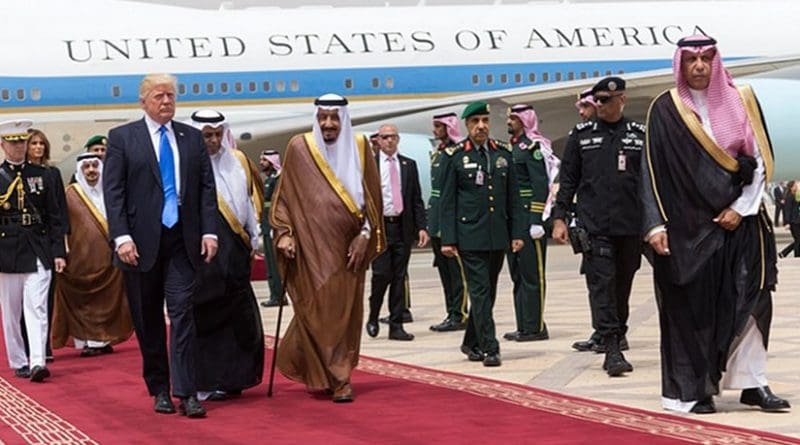Trump Inaugurates New Era Of US-Arab Partnership – OpEd
By Arab News
By Oubai Shahbandar*
The red, white and blue (and of course the Saudi green) were on full display as President Donald Trump made his maiden trip to the land of Islam’s two holiest cities in a watershed moment in US relations with the Islamic world. The grand welcome he received by King Salman is front-page news all over the US media. The Drudge Report, America’s most widely read online news aggregator, ran the banner headline: “Welcome fit for king.”
The impact of the reception in Riyadh was of such magnitude that Israel has reportedly made last-minute adjustments for its own welcome program for Trump on Monday, in an attempt to match the scale and ceremony of the Saudi visit.
Behind the pageantry it was all business. In their joint press conference, Secretary of State Rex Tillerson and Foreign Minister Adel Al-Jubeir stressed the historic moment of the visit and the efforts by both countries to recommit and strengthen this vital strategic partnership.
And lest there be any doubt on where the US stands on Iran, Tillerson reiterated that Tehran’s continued sponsorship of terror groups throughout the region (and indeed globally) remains a national security threat for his country and the Kingdom.
The gathering of American CEOs, and the commitments made for investments from both sides, highlighted that our two countries are bound by mutually beneficial interests. American political and defense commentators stressed the hundreds if not thousands of jobs that will be created as a result of the $100 billion arms deals signed at the Riyadh Summit. In other words, the Trump visit has proven to be a win-win for all parties.
Just as remarkable has been the genuine and heartfelt grassroots response in Saudi Arabia to Trump and “brand America.” The cultural intersection between America and Arabia was beautifully broadcast as Saudis gathered for Harley Davidson motorcycle rallies and country music concerts, cheering when the American anthem played in the stadium. Trump and his Cabinet partaking in the traditional ardha dance along with the king is a sight that will be imprinted in the annals of US history for generations to come.
The fact that Trump made Riyadh his first stop abroad as president speaks volumes. A major impetus for this decision seems to have been the March visit to Washington by Saudi Deputy Crown Prince Mohammed bin Salman. Insiders viewed the trip as a success.
The deputy crown prince discussed not just enhancing counterterrorism and defense cooperation with the US, but significantly increasing Saudi investment in the country and paving the way for more American companies to do business in the Kingdom.
Moreover, Trump’s participation in a 50-nation summit of majority-Muslim countries, where countering extremism and Iran’s malign interference in the region will be the main topics of discussion, is a positive step and goes a long way to countering the toxic narrative that the US is engaged in an ostensible war against the world’s 1 billion-plus Muslims.
The convergence of national security interests between the US and Saudi Arabia were spelled out by National Security Adviser H.R. McMaster. He said a main thrust for Trump’s visit would be to “encourage our Arab and Muslim partners to take bold, new steps to promote peace and to confront those, from ISIS (Daesh) to Al-Qaeda to Iran to the Assad regime, who perpetuate chaos and violence that has inflicted so much suffering throughout the Muslim world and beyond.”
The message is that the US and the Muslim world share common adversaries and threats to their security. Even more interesting is the declaration of Iran and the Syrian regime as being destabilizing dangers on par with Al-Qaeda and Daesh.
If there ever was a clear break from former President Barack Obama’s Middle East policy — which almost exclusively invested in the Iran nuclear deal and viewed Saudi Arabia with cordial yet cold detachment — this was it.
US national security interests align with Saudi Arabia. On a strategic level, Iran’s ambitions to achieve nuclear weaponization are merely delayed for a decade. Meanwhile, it is seeking to expand its Shiite extremist militant network that threatens both the Arab world and US security.
This means both American soldiers on the frontlines in Iraq and Syria, and Saudi and Arab Coalition troops in Yemen, are threatened by Iranian Supreme Leader Ali Khamenei’s grand ambitions.
We should never lose sight of the sober reality that as the summit comes to conclusion, there remains a great deal of work to be done toward ensuring that regional security and economic opportunity can offer the youth of the Arab and Muslim worlds a path to succeed. That is how the scourge of extremism and nihilistic violence can finally be neutralized.
To put things in perspective, Iran’s main militant commander in Iraq, Qays Khazali, gave a speech last week where he discussed active efforts to expand Iran’s “Shiite Crescent” into a “full moon” throughout the region.
Khazali is ardently pro-Iran, anti-US and anti-Saudi, and has openly declared his readiness to launch attacks against American forces in either Iraq or Syria if given the order by Qasem Soleimani, commander of Iran’s Revolutionary Guard Corps (IRGC).
Trump, in visiting Saudi Arabia, has reset relations with the Muslim and Arab worlds. His heartfelt address to the Muslim world from his stage in the Kingdom provided much-needed reassurance that the Obama era of hollow rhetoric, which allowed extremism such as Daesh and Iran’s state-sponsored terror to flourish, shall be a relic of the past.
Together we prevail. Let us look to the future now with renewed confidence that the bond between the US and its historic ally is as strong as ever.
*Oubai Shahbandar is a former Department of Defense senior adviser, and currently a strategic communications consultant specializing in Middle Eastern and Gulf affairs.

